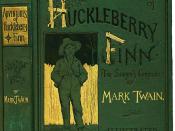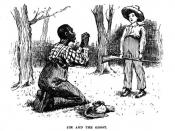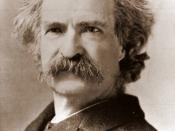In a recent survey of attempts to ban books in the United States, the American Library Association ranked Huckleberry Finn the fifth most frequently challenged book of the 1990s. In recent years, there has been increasing debate of the apparently racist ideas expressed by Mark Twain in Huckleberry Finn. In some extreme cases the novel has even been banned by public school systems and censored by public libraries. The basis for these censorship campaigns has been the depiction of one of the main characters in Huckleberry Finn, Jim, a black slave. Several points in the novel Jim's character is described to the reader, and some people have looked upon the description as racist. If one were to look closely at Huckleberry Finn, one would realize that it is not racist and that it actually supports the idea of anti-slavery.
After the novel was first published it as already beginning to be contested.
Shortly after its publication, a committee that found it "more suited to the slums than to intelligent, respectable people" banned Huckleberry Finn from the Concord Public Library. Mark Twain's use of dialect and first person narration from an unschooled child were shocking to the cultural elite of the time. Until this novel was published, most people were not used to such casual dialect in literature. Society felt that the text in the novel was complete vulgarity.
Recently Huckleberry Finn has been contested not for its casual dialect, but for its supposedly racist ideas. The controversy caused by Huckleberry Finn has actually ended up in court. Kathy Monteiro began her campaign to have Huckleberry Finn removed from the curriculum a few years ago. Along with bringing the case to the courts, she picketed outside City Hall, addressed the school board, and met with city officials. Her...



Very very good
This essay is excellent. You have outstanding sentence structure, and you vary the types of sentences. Your grammar is great, and there is a lot of information in this piece. Your thoughts/information is very well thought-out and worded appropriately. I enjoyed reading this very much.
5 out of 5 people found this comment useful.